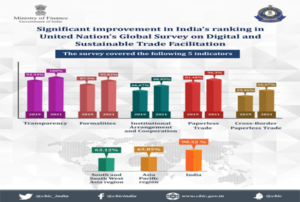In news
India has scored 90.32% in United Nations Economic and Social Commission for Asia Pacific’s (UNESCAP) latest Global Survey on Digital and Sustainable Trade Facilitation(with a jump of 78.49%).
Highlights of the survey
- After evaluation of 143 economies, the 2021 Survey has highlighted India’s significant improvement in the scores on all 5 key indicators, as follows:
- Transparency:100% in 2021 (from 93.33% in 2019)
- Formalities: 95.83% in 2021 (from 87.5% in 2019)
- Institutional Arrangement and Cooperation: 88.89% in 2021 (from 66.67% in 2019)
- Paperless Trade: 96.3% in 2021 (from 81.48% in 2019)
- Cross-Border Paperless Trade: 66.67% in 2021 (from 55.56% in 2019).

- The Survey noted that India is the best performing country when compared to South and South West Asia region (63.12%) and Asia Pacific region (65.85%).
- The overall score of India has also been found to be greater than many OECD countries including France, UK, Canada, Norway, Finland etc. and the overall score is greater than the average score of EU.
- India has achieved a 100% score for the Transparency index and 66% in the “Women in trade” component.
Role of The Central Board of Indirect Taxes and Customs(CBIC) in improvement
- CBIC, has been at forefront of path breaking reforms under the umbrella of ‘Turant’ Customs to usher in a Faceless, Paperless and Contactless Customs by way of a series of reforms.
- This has had a direct impact in terms of the improvement in the UNESCAP rankings on digital and sustainable trade facilitation.
- A dedicated single window COVID-19 24*7 helpdesk for EXIM trade was created on the CBIC website to facilitate quick resolution of issue(s) faced by importers.
About the Survey:
- The Global Survey on Digital and Sustainable Trade Facilitation is conducted every two years by UNESCAP.
- The 2021 Survey includes an assessment of 58 trade facilitation measures covered by the WTO’s Trade Facilitation Agreement.
- Survey covers 58 measured in three main areas:
- General Trade Facilitation, referring to the implementation of selected measures under the WTO Trade Facilitation Agreement (TFA);
- Digital Trade Facilitation, referring to the implementation of innovative, technology-driven measures aimed at enabling the use and exchange of electronic trade data and documents;
- Sustainable Trade Facilitation, referring to trade facilitation for SMEs, agricultural sector and women
- In addition, this year survey includes measures covering 2 more areas:
- Trade Finance, referring to facilitation of access to trade finance services; and
- Trade Facilitation in Times of Crisis on immediate and long-term measures aimed at addressing crisis and pandemic situations including the COVID-19.
- The Survey evidences whether or not the trade facilitation measures being taken have the desired impact and helps draw comparison amongst countries.
- A higher score for a country also helps businesses in their investment decisions.
The United Nations Economic and Social Commission for Asia and the Pacific(UNESCAP)
- UNESCAP is one of the five regional commissions under the jurisdiction of the United Nations Economic and Social Council.
- Founded: 28 March 1947
- Headquarters: Bangkok, Thailand
- It serves as the United Nations’ regional hub promoting cooperation among countries to achieve inclusive and sustainable development.
- It is the largest regional intergovernmental platform with 53 Member States and 9 associate members
- ESCAP has emerged as a strong regional think-tank offering countries sound analytical products that shed insight into the evolving economic, social and environmental dynamics of the region.
The overall objective of ESCAP is to promote inclusive and sustainable economic and social development in the Asia-Pacific region, with priority accorded to the implementation of the 2030 Agenda for Sustainable Development and the achievement of the Sustainable Development Goals.














